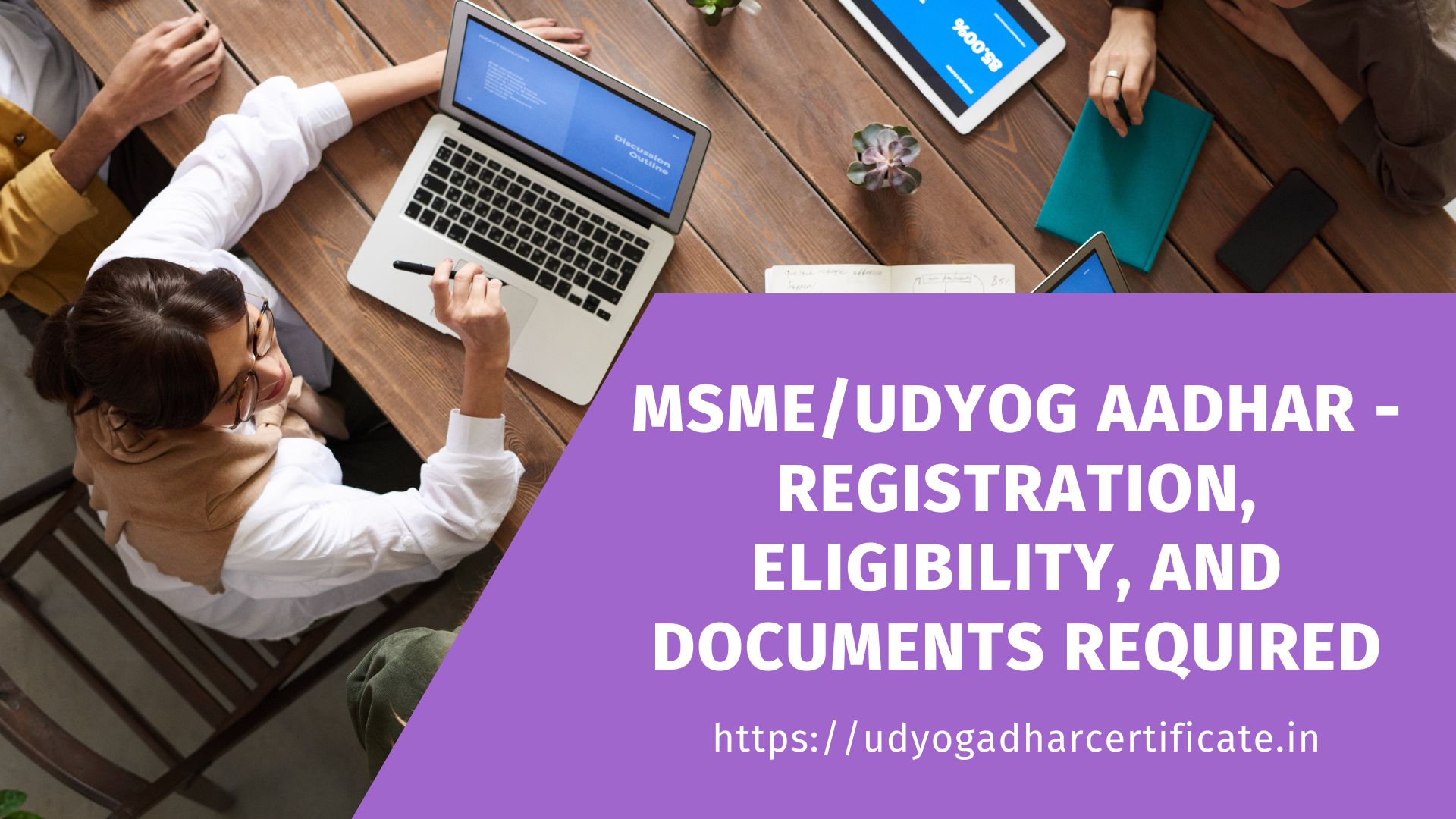Introduction:
The Micro, Small, and Medium Enterprises (MSME) sector plays a crucial role in the economic growth and development of a country. In India, the MSME sector is considered the backbone of the economy, providing employment opportunities and contributing significantly to the GDP. To support and promote this sector, the Government of India has introduced various schemes and initiatives, including the Udyog Aadhar registration. In this article, we will explore the process of MSME/Udyog Aadhar registration, eligibility criteria, and the documents required to complete the registration.
Udyam Registration Process:
The Udyog Aadhar registration is a simplified online process that enables MSMEs to obtain a unique identification number. This registration facilitates availing various benefits and schemes offered by the government. Here are the steps to register for MSME/Udyog Aadhar:
- Visit the Udyog Aadhar official website.
- Fill out the online registration form with the required information.
- Provide details such as Aadhar number, name of the owner, category of enterprise, PAN details, business address, and bank account information.
- Upload the necessary documents.
- Submit the application.
Eligibility Criteria:
To be eligible for MSME/Udyog Aadhar registration, the following criteria must be met:
The enterprise should be a micro, small, or medium enterprise as per the definitions provided by the MSME Development (MSMED) Act, 2006.
- Micro enterprise: Investment in plant and machinery or equipment should not exceed Rs. 1 crore.
- Small enterprise: Investment in plant and machinery or equipment should be between Rs. 1 crore and Rs. 10 crores.
- Medium enterprise: Investment in plant and machinery or equipment should be between Rs. 10 crores and Rs. 50 crores.
The enterprise should be a valid business entity and involved in manufacturing or service activities.
The business should not be engaged in any illegal or restricted activities.
Documents Required:
To complete the MSME/Udyog Aadhar registration, the following documents are typically required:
- Aadhar card of the owner/partner/director.
- PAN card of the enterprise.
- Address proof of the business premises (electricity bill, telephone bill, etc.).
- Bank account details of the enterprise.
- Partnership deed (if applicable) or certificate of incorporation in the case of companies.
- Proof of investment in plant and machinery or equipment.
Benefits of MSME/Udyog Aadhar Registration:
Access to Government Schemes and Incentives:
MSME/Udyog Aadhar registration enables businesses to avail various government schemes, subsidies, and incentives targeted at supporting and promoting the MSME sector. These schemes may include financial assistance, credit facilities, tax benefits, and technology upgradation support.
Collateral-free Loans:
Registered MSMEs can benefit from collateral-free loans provided by financial institutions under schemes like Credit Guarantee Fund Trust for Micro and Small Enterprises (CGTMSE). This reduces the burden of collateral requirements, making it easier for MSMEs to secure financial assistance for their business activities.
Credit Linked Capital Subsidy Scheme (CLCSS):
The CLCSS scheme offers a capital subsidy for technology upgradation to enhance the competitiveness of MSMEs. Registered MSMEs can avail of this subsidy for upgrading their plant and machinery, thus improving productivity and quality.
Priority in Government Procurement:
MSMEs with Udyog Aadhar registration enjoy priority in government procurement processes. Government agencies often have reservation quotas for procuring goods and services from MSMEs, providing a significant market opportunity for registered enterprises.
Reimbursement of ISO Certification Expenses:
Registered MSMEs can claim reimbursement of the expenses incurred in obtaining ISO certification. This reimbursement can significantly reduce the financial burden of acquiring quality certifications, which are often required for business expansion and exports.
Ease of Obtaining Licenses and Registrations:
Udyog Aadhar registration simplifies the process of obtaining various licenses and registrations required for conducting business operations. It eliminates the need to submit separate documentary proof for every registration, making it a time-saving and hassle-free process.
Bar Code Registration Subsidy:
MSMEs engaged in manufacturing or production activities can receive a subsidy for bar code registration, which is essential for product identification, inventory management, and retail distribution.
Intellectual Property Rights (IPR) Support:
Registered MSMEs can receive financial assistance for acquiring patents, trademarks, and copyrights through the MSME Intellectual Property Promotion (MIPP) scheme. This support helps businesses protect their innovative ideas and creations, fostering a culture of innovation and competitiveness.
Export Promotion:
Udyog Aadhar registration opens doors for MSMEs to explore international markets and expand their business through export promotion schemes. Registered enterprises can access incentives, subsidies, and assistance provided by organizations such as the Export Promotion Councils (EPCs) to facilitate their export activities.
Market Development Assistance:
The government offers Market Development Assistance (MDA) to MSMEs participating in trade fairs, exhibitions, and buyer-seller meets. This assistance covers expenses related to stall rentals, transportation, and promotional material, reducing the financial burden and encouraging MSMEs to showcase their products and services on a global platform.
Skill Development and Training Programs:
Registered MSMEs have access to skill development and training programs organized by various government agencies. These programs aim to enhance the skills of the workforce, improve productivity, and foster innovation within the MSME sector.
Cluster Development Initiatives:
Udyog Aadhar registration allows MSMEs to participate in cluster development initiatives, which focus on creating a supportive ecosystem for specific industries or sectors. These initiatives promote collaboration, knowledge sharing, and infrastructure development, enabling MSMEs to thrive in a competitive business environment.
Ease of Doing Business:
Being a registered MSME with Udyog Aadhar brings credibility to the business and enhances its reputation. It instills confidence in potential customers, suppliers, and financial institutions, thereby facilitating smoother business transactions and partnerships.
Business Support and Consultancy:
Registered MSMEs can access specialized business support services and consultancy provided by government bodies and industry associations. These services offer guidance on various aspects such as technology adoption, marketing strategies, financial management, and compliance requirements, helping MSMEs overcome challenges and make informed business decisions.
Technology and Innovation Support:
Registered MSMEs can benefit from government initiatives aimed at fostering technology adoption and innovation. Various schemes provide financial assistance for upgrading technology, conducting research and development activities, and implementing advanced manufacturing processes. This support helps MSMEs enhance their productivity, product quality, and competitiveness in the market.
Access to Incubation and Co-working Spaces:
Udyog Aadhar registration opens doors for MSMEs to avail themselves of incubation and co-working spaces provided by government bodies, industry associations, and technology parks. These spaces offer infrastructure facilities, mentorship, networking opportunities, and access to a vibrant ecosystem of entrepreneurs, investors, and industry experts.
Regulatory and Compliance Benefits:
Registered MSMEs often enjoy certain regulatory and compliance benefits, such as relaxation in environmental clearances, simplified inspection procedures, and exemption from certain labor law provisions. These benefits reduce the administrative burden on MSMEs and create a favorable business environment for their operations.
Financial and Tax Incentives:
Udyog Aadhar registration enables MSMEs to access financial incentives provided by the government, such as subsidies on loans, interest rate concessions, and reimbursement of expenses incurred in obtaining various certifications. Additionally, MSMEs may benefit from tax incentives and exemptions, including reduced tax rates, tax holidays, and simplified tax compliance procedures.
Networking and Collaboration Opportunities:
Registered MSMEs become part of a larger network of MSMEs, industry associations, and government agencies. This opens up opportunities for collaboration, joint ventures, and partnerships, fostering knowledge sharing, innovation, and business growth.
Social Security Schemes:
MSME/Udyog Aadhar registration makes businesses eligible for various social security schemes offered by the government. These schemes include insurance coverage for employees, healthcare benefits, and pension schemes, ensuring the well-being and security of the workforce.
Branding and Marketing Support:
Registered MSMEs can receive support for branding and marketing their products and services. This assistance may include participation in domestic and international trade fairs, exhibitions, and buyer-seller meets, as well as promotional campaigns and assistance in accessing e-commerce platforms.
Suggested read- udyam registration benefits
Conclusion:
Obtaining the MSME/Udyog Aadhar registration can bring numerous benefits to micro, small, and medium enterprises in India. It not only provides recognition but also enables them to access various government schemes, subsidies, and incentives. The simplified online registration process and the ease of documentation make it convenient for entrepreneurs to register their enterprises. By leveraging the advantages offered by MSME/Udyog Aadhar registration, businesses can unlock opportunities for growth, development, and competitiveness in the dynamic Indian market. sprunki horror Endless Fun Awaits!



